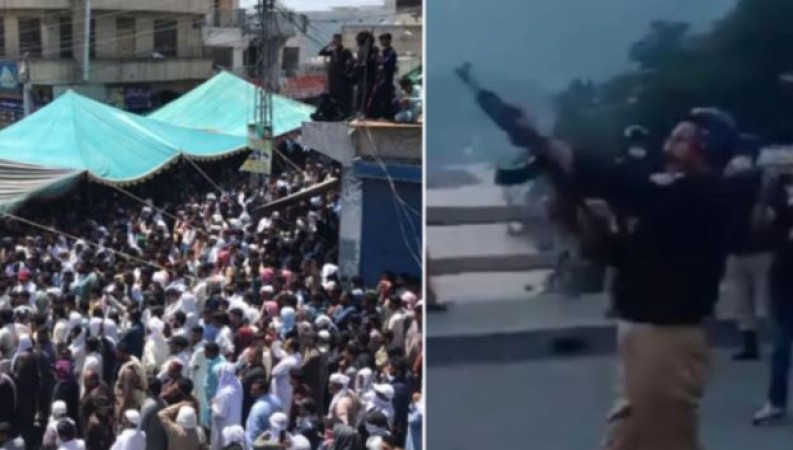
Srinagar: Videos emerged on Saturday, May 11th, from Pakistan-occupied Jammu and Kashmir (PoJK) showing civilians pelting stones at security personnel during protests. The residents of PoJK are reportedly protesting against inflation and the anti-PoJK policies of the Pakistani government.
Rising electricity prices and the withdrawal of wheat subsidies have forced residents onto the streets in protest. Severe taxes and a lack of basic amenities have fueled widespread unrest in the occupied territory, leading to violent protests. These recent events have highlighted the harsh realities of the Pakistani administration in the territory occupied from India.
Azadi slogans in Kashmir.... Not Indian Kashmir but Pakistan Occupied Kashmir (POK). Pakistan is heading towards a civil war & it started from POK-Balochistan.
— Mr Sinha (Modi's family) (@MrSinha_) May 11, 2024
Before 2014 it was normal in Indian Kashmir, the situation has completely reversed in the past 10 years.. pic.twitter.com/NMZQHSLkWN
Pakistan is currently facing significant economic pressure. A nearly empty treasury, political instability, and ever-rising foreign loans have put the government under scrutiny. The International Monetary Fund (IMF) recently urged Pakistan to implement "strong cost-side reforms" to restore the viability of the country's energy sector. IMF recommended ending power subsidies to the energy sector in the upcoming 2024-25 budget. However, the pressure on the public is already evident with rising electricity prices. For instance, the current price per unit is Rs 22 for under 100 units and rises to Rs 65 per unit for usage over 700 units per billing cycle.
The increase in tariff brackets has exacerbated discontent among the masses. Additionally, the central government's removal of wheat subsidies and rampant corruption in the bureaucracy have added to the hardships faced by the people. Electricity generated in the PoJK area is also reportedly being diverted to larger cities in Pakistan, further angering locals.
In response to the Pakistani government's actions, locals took to the streets. However, instead of engaging in dialogue, the Pakistani government chose to suppress the protests using force. Several units of Pakistani rangers and local police were deployed to disperse the protests. Contrary to expectations, the protests turned violent, and videos showed security agencies being pushed back. Pakistani rangers were seen using AK-47s on civilians, resulting in the deaths of at least two protesters and exposing human rights violations in the region.
According to reports, the Jammu Kashmir Joint Awami Action Committee announced a march to protest against the government's policies. However, over 70 activists associated with the committee were arrested by security agencies. Pakistani rangers did not spare children either, as tear gas shells reportedly fell inside a school, injuring female students.
Several leaders in PoJK have emerged as voices for the distressed public. Shaukat Nawaz Mir has become a prominent figure, advocating for the rights and identity of the people of PoJK. In a statement, he said, "Put any tag on us, but as long as God is with us, you cannot harm us. Let us live in peace. If you raid people’s houses again and arrest them, there will be no peace. I am saying this openly. I appeal to everyone to save your region, save your identity. If your identity remains intact, everything will be possible; otherwise, nothing could be achieved. I have faith in all of you that you will fight this long battle and achieve success. The battle has to be fought with peace and by saving ourselves. It will be difficult to fight if you don’t stay grounded."
Contrasting the situation in PoJK with that of Jammu and Kashmir on India’s side reveals a stark difference. Since the revocation of Article 370 in August 2019, the Union Territory of Jammu and Kashmir has experienced significant growth. With systematic public and private investment, the implementation of national schemes, and strategic policies for the region, Jammu and Kashmir has seen unprecedented progress. Lower inflation rates, consistent subsidies, and improved infrastructure demonstrate how India is ensuring the stability and growth of the region. The impact of India’s efforts will be seen in regional politics in the coming years, highlighting the importance of strategic governance models that curb terrorist activities and promote regional development, leading to peace and prosperity.
The ongoing crisis in PoJK underscores the failures of the Pakistani government to address the aspirations and needs of the region's people. There is a clear difference between how the Indian government and the Pakistani government handle dissent in the region. It underscores the importance of strategic policies for peace and stability, something the Pakistani government is unable to provide due to its economic and political instability.
The international community must recognize and address the plight of the people of PoJK and ensure that their voices are not lost amidst the incompetence of the Pakistani government.
Mehbooba Mufti Alleges Imposition of Section 144 in Pulwama
Assam Police Seizes Heroin Worth Rs 7 Crore in Cachar District
Job Scam: Man Cheats Father of Rs 6 Lakh in Thane, Maharashtra